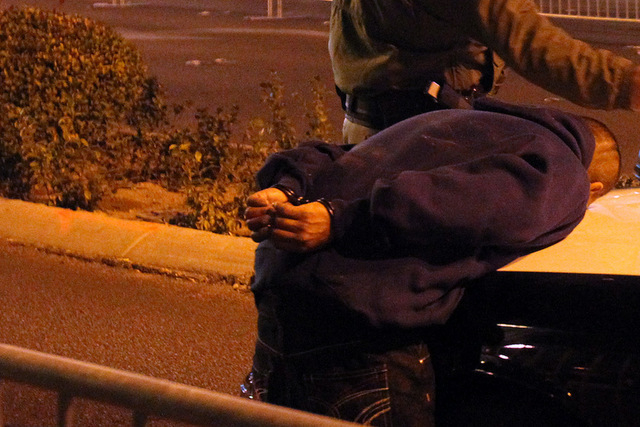Metro announces new effort to curb gang membership
In an effort to curb gang membership, Las Vegas police on Monday announced they will focus on dissuading gang affiliation at the start.
Kids and adults alike who police believe have either joined a gang or are associating with known gang members will be contacted by members of the gang crimes bureau either in person or through the mail.
For kids, Metro will contact a parent or guardian in person. “The home visit will provide notice to the subject, parent/guardian and will assist in determining the validity of such designation,” according to Metro’s 335-word notification and review policy. “More importantly it will identify individuals willing to accept assistance, services and mentoring opportunities in an effort to prevent/intervene future gang activities.”
Those under 18 can be removed from the gang database by proving they have quit the gang or were never a member. Evidence that would persuade police to remove gang members from the list includes continuing their education, getting a job, or service to civic or religious groups.
Adults will be sent a letter that will include how they can remove their name from the gang database.
The three-page “Gang Database Removal Request” asks pertinent questions such as if the person has any “tattoos which would be considered gang specific… please describe.”
The policy change has been in place for months, but was formalized this week, said Deputy Chief Al Salinas, who oversees investigative services at Metro.
So far the response has been about 50-50 from parents, Salinas said. “Some parents don’t want to hear it. Others are appreciative. Sometimes parents don’t realize their children are affiliated with gang members.”
But not everyone is convinced the changes do enough.
“In our view the policy is far from ideal,” said Allen Lichtenstein, general counsel for the American Civil Liberties Union of Nevada, who participated in meetings to update the policy. “We’d like to see further changes, but that being said, it is a major step toward transparency.”
Lichtenstein explained that the former policy was “kind of secret.” The criteria that could get someone listed on Metro’s countywide gang database was nebulous, he said.
The qualifications included frequenting a known gang location, associating with known gang members or wearing gang colors.
But what if someone lived in a housing project rife with gang members or had family members who were in a gang, Lichtenstein said. The qualifications were too subjective, he said.
Some of those qualifications still exist, but Lichtenstein said the ACLU knew they wouldn’t win on every count.
The most important policy change will allow a person the opportunity to appeal their listing in the gang database. “We think it adds a significant due process protection that wasn’t there before,” he said, especially since some people were put in the database without knowing it.
Lichtenstein added he hopes Metro will include bringing social workers while visiting parents of gang members. “It’s probably better to not have police do it,” he said, adding that people with social service backgrounds would be more effective.
But Lichtenstein applauded Metro for “taking that positive step.”
The database is still an important tool for police, Salinas said. “We need to ID those who perpetuate violence in the community.”
However, creating an appeals process was important to try to help those who were seeking a way out of a gang lifestyle, Salinas said.
He explained that someone hoping to join the military might be rejected if their name appeared in the database. The appeal option allows for someone to get off the list and pursue a life outside of gangs.
“Our goal is to help those individuals who want to be helped,” Salinas said.
Contact reporter Francis McCabe at fmccabe@reviewjournal.com. Find him on Twitter: @fjmccabe




























